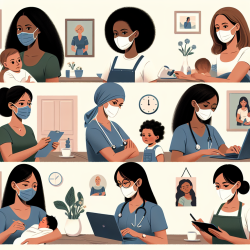Introduction
Chronic pain is a pervasive issue affecting millions worldwide, with a significant impact on healthcare systems. The study titled "Hearing New Voices: Registered Nurses and Health Technicians Experience Caring for Chronic Pain Patients in Primary Care Clinics" sheds light on the experiences of Registered Nurses (RNs) and Health Technicians (HTs) in managing chronic pain patients in primary care settings. This blog explores how practitioners can enhance their skills by implementing the outcomes of this research or by conducting further investigations.
Key Findings and Themes
The study identified five themes from the experiences of RNs and HTs:
- Primacy of Medications and Accompanying Clinical Quandaries: Medications play a central role in chronic pain management, but they also present challenges such as balancing pain relief with addiction risks.
- System Barriers: Structural and resource-driven barriers, such as clinic design flaws and lack of alternative therapies, impede effective pain management.
- Dealing with Failure: Practitioners often feel a sense of futility due to their perceived inability to alleviate patients' pain.
- Importance of Team-Based Care: Interdisciplinary collaboration is crucial for improving patient outcomes and ensuring system compliance.
- Making a Difference by Providing Patient-Centered Care: RNs and HTs emphasize the importance of empathetic, patient-centered approaches in improving patients' quality of life.
Implementing Research Outcomes
Practitioners can enhance their skills by focusing on the following strategies:
- Emphasize Team-Based Care: Foster interdisciplinary collaboration to address complex pain management issues. Encourage open communication and consensus-building among team members.
- Address System Barriers: Advocate for structural changes, such as extended clinic hours and improved access to alternative therapies, to enhance patient care.
- Enhance Patient-Centered Care: Prioritize empathy and patient engagement in care plans. Educate patients about pain management options and involve them in decision-making.
- Continuous Education and Training: Engage in ongoing professional development to stay informed about the latest pain management techniques and evidence-based practices.
Encouraging Further Research
While the study provides valuable insights, further research is needed to explore the perspectives of other healthcare professionals and patients. Investigating the impact of specific interventions and educational programs on chronic pain management outcomes could also be beneficial.
Conclusion
The insights from RNs and HTs in the study highlight the importance of team-based, patient-centered care in managing chronic pain. By addressing system barriers and prioritizing empathy and education, practitioners can improve outcomes for chronic pain patients. To delve deeper into the original research, please follow this link: Hearing New Voices: Registered Nurses and Health Technicians Experience Caring for Chronic Pain Patients in Primary Care Clinics.










